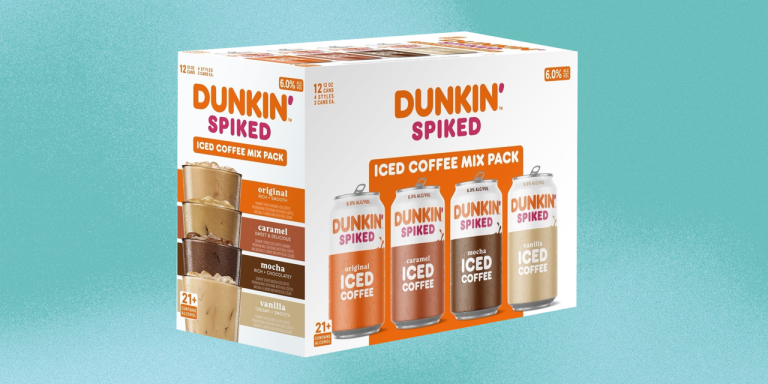
Dunkin’s latest product launch is sparking some chatter—and no, it’s not their looming pumpkin spice line: Their new boozy canned coffee and tea drinks will be hitting stores in a few weeks, according to the company’s announcement on August 14.
The Dunkin’ Spiked line will include eight flavors: Original, Caramel, Mocha, and Vanilla iced coffees, and Slightly Sweet, Half and Half, Strawberry Dragonfruit, and Mango Pineapple iced teas. The 12-and 19-ounce drinks will be sold at US retail stores in 12 states—Connecticut, Delaware, Florida, Maine, Massachusetts, New Hampshire, New Jersey, New York, Pennsylvania, Rhode Island, Texas, and Vermont—starting in late August and early September.
The beverages contain real coffee and tea, as well as a malt base. The boozy iced coffees will have 6% ABV, while their spiked teas come in slightly lower at 5%, according to a press release a Dunkin’ rep provided to SELF. For comparison, that’s roughly the same amount of alcohol you’d find in a beer.
Mixing coffee or tea with booze isn’t new, of course—cans of Twisted Tea have sold for decades, and espresso martinis have been a popular order at bars for even longer. But when one of the largest coffee brands in the country drops a line of spirits, it makes you think a little harder about the blend. Specifically, it brought up the question: Can that combination of alcohol and caffeine be a potentially dicey mix? SELF connected with a registered dietitian to get all of your questions answered. Here’s what you should know.
What happens when you mix caffeine with alcohol?
First, let’s talk about what you can experience with both of these substances. Caffeine is a stimulant, meaning that it revs up your central nervous system, boosting your alertness and energy levels. As a result, taking in too much of it—more on that below—can cause symptoms like insomnia, jitters, anxiety, fast heart rate, upset stomach, nausea, or headache, Amanda Sauceda, RD, a registered dietitian who works with people with digestive disorders, tells SELF.
On the other hand, alcohol has the opposite effect on your body, says Sauceda. Booze operates as a depressant, meaning that it slows down your central nervous system and brain activity. This can influence your mood and behavior, making it hard to think clearly, according to the National Institute of Alcohol Abuse and Alcoholism (NIAAA).
When you mix the two, caffeine can cover up the sedating effects of alcohol, says Sauceda. This can mask the warning signs of having taken in a little too much booze, like slow responses and mental fogginess, she explains. So it could make you think you can drink another round, and as a result, you can become more intoxicated than you realize.
Plus, the combination can increase heart rate and blood pressure, Sauceda says, which can raise the risk of heart attack or other issues, especially in folks with hypertension. What’s more, it can also make you more likely to become dehydrated, too, she says.